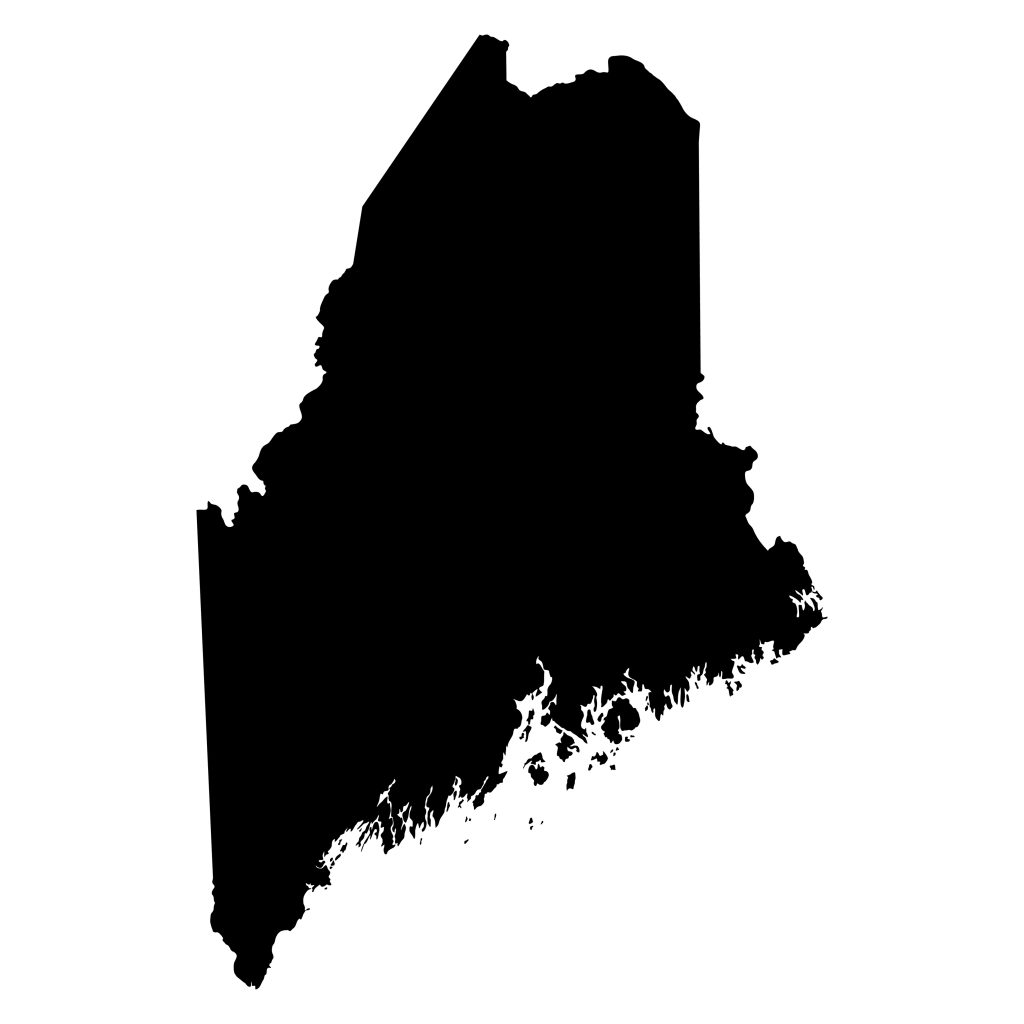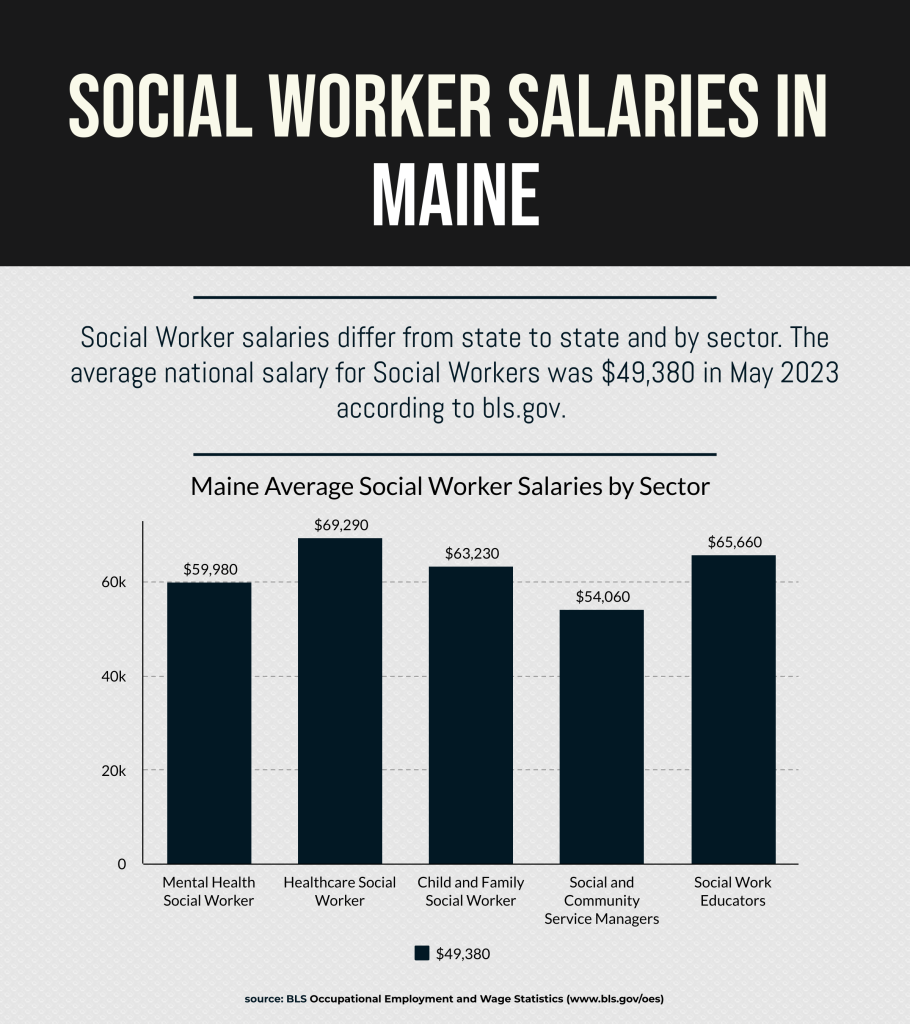
Learn how to become a licensed Social Worker In Maine. License, education, and employment information for anyone interested in Social Work in Maine. This northernmost state in the contiguous US and has a population of approximately 1.3 million people.
Maine is a state located in the New England region of the United States. Known for its rugged coastline and picturesque landscapes, Maine is often referred to as the “Pine Tree State” due to its abundant forests. One of the main attractions in Maine is Acadia National Park, which spans over 49,000 acres and offers breathtaking views of the Atlantic Ocean, granite peaks, and picturesque hiking trails. The state is also famous for its fresh seafood, particularly lobsters, which are a staple in many local dishes.
Why Become a Social Worker in Maine?
Maine is also steeped in history, with several historic lighthouses dotting the coast. The state has a rich maritime heritage and was once a major shipbuilding center. Visitors can explore the maritime history at various museums and historic sites, such as the Maine Maritime Museum in Bath.
There are two broad types of social work. Direct practice Social Work requires a license in some states and an undergraduate degree. These professionals help clients through challenges by assessing needs and finding resources. However, all states require a license to practice Clinical Social Work and typically a master’s degree. Clinical social work involves treating mental and behavioral health or emotional issues. Each state has a slightly different process for how to become a social worker and for how to become a Licensed Clinical Social Worker.
What are the Social Work Education Requirements In Maine?
In Maine, individuals must meet certain education requirements. The specific requirements may vary depending on the type of social work and the level of licensure sought. Here are the general education requirements for a licensed master social worker in Maine:
1. Bachelor’s Degree: The minimum education requirement in Maine to become a social worker is a bachelor’s degree (BSW) from a program accredited by the Council on Social Work Education (CSWE). This degree typically takes four years to complete and provides students with a foundation in social work theory, research, and practice.
2. Master’s Degree: While a bachelor’s degree in social work is sufficient for entry-level positions in the field, individuals who wish to pursue advanced practice or clinical roles need to obtain a master’s degree in social work (MSW). The MSW program generally takes two years to complete and includes both classroom instruction and supervised fieldwork.
3. Field Education: Field education, also known as practicum or internship, is a crucial component of social work education. Students in both BSW and MSW programs are required to complete a specified number of hours in supervised field placements, where they gain hands-on experience and apply the knowledge and skills learned in the classroom.
4. Licensure: To practice in Maine, individuals must obtain a license from the Maine State Board of Social Worker Licensure. The specific licensure requirements vary depending on the level of practice.
You may also be required to do continuing education and other requirements. This would include various continuing education courses, a criminal background check, an ASWB clinical exam, and a psychosocial assessment.
What are the Social Work Licensing Requirements in Maine?
The Maine State Board of Social Worker Licensure issues licenses for social workers in the state.
Licensed Social Worker (LSW)
For a fully Licensed Social Worker (LSW) in Maine, you must have a Bachelor’s degree in social work (BSW) from a Council on Social Work Education (CSWE) accredited program. You must also complete a minimum of 3,200 hours of supervised social work experience within two years. Additionally, you must pass the Association of Social Work Boards (ASWB) bachelor’s level exam.
Licensed Master Social Worker (LMSW)
For a Licensed Master Social Worker (LMSW) in Maine, you must have a Master’s degree in social work (MSW) from a CSWE-accredited program. You must also complete a minimum of 3,200 hours of supervised social work experience within two years. Additionally, you must pass the ASWB master’s level exam.
Licensed Clinical Social Worker (LCSW)
How do I become a clinical social worker in Maine? For a Licensed Clinical Social Worker (LCSW) in Maine, you must have a Master’s degree in social work (MSW) from a CSWE-accredited program. You must also complete a minimum of 3,200 hours of supervised clinical social work experience within two years. Additionally, you must pass the ASWB clinical exam. You will also need to obtain clinical supervision from a licensed clinical social worker during your supervised experience.
Can You Get a Social Work License by Endorsement in Maine?
Yes, you can get a social work license by endorsement in Maine. The Maine State Board of Social Worker Licensure allows individuals who are licensed in another state to apply for licensure in Maine through the endorsement process. To be eligible for endorsement, you must meet the education and experience requirements specified by the Board. You will also need to submit an application, pay the required fees, provide verification of your current license, and meet any other additional requirements set by the Board.
How Long Does it Take to Become a Social Worker in Maine?
In Maine, you will need to complete a Bachelor’s degree in social work (BSW) or a Master’s degree in social work (MSW) from an accredited institution.
If you already hold a BSW, it typically takes around 2 years to complete an MSW program. If you do not have a bachelor’s degree in social work, it generally takes around 4 years to complete a BSW program and then an additional 2 years to complete an MSW program.
After completing the required education, you will need to accumulate supervised field experience. For a BSW, you will typically need to complete around 400 hours of supervised fieldwork. For an MSW, you will typically need to complete around 900 hours of supervised fieldwork.
Once you have completed your education and supervised field experience, you will need to apply for licensure with the Maine State Board of Social Worker Licensure. The application process can take several weeks to complete.
Overall, becoming a licensed social worker conditional on your educational path and other factors. In Maine, it can take between 4 to 6 years.
How Much Does a Licensed Social Worker Make in Maine?
Based on recent labor statistics, the salary of conditionally licensed social workers in Maine can vary depending on the level of education, experience, and job role. According to the Bureau of Labor Statistics data, the median annual wage for child, family, and school social workers in Maine was $61,760, while the median annual wage for healthcare social workers was $60,430. The median wage for all licensed social workers in the state was $51,000. Those with a doctoral degree are top earners.
- Child, family, and school social workers in Maine earn $61,760
- Healthcare social workers in Maine earn $60,430
- Mental health and substance abuse social workers in Maine earn $68,900
- Social workers, all other in Maine earn $58,000
It’s important to note that these figures represent median wages, which means that half of social workers in the state earn more than these amounts, while half earn less. Additionally, wages can vary depending on the specific location within Maine, as well as the type of employer (public sector, nonprofit, private practice, etc.).
It is also worth mentioning that a licensed social worker may earn additional compensation through benefits such as health insurance, retirement plans, and other perks that can vary from employer to employer.

What Type of Careers Can a Clinical Social Worker Get in Maine?
A licensed social worker can pursue a variety of career paths in various settings, including:
1. Child and Family Social Workers
These professionals work with children and families to provide counseling, support, and advocacy to promote the well-being of children. They may work in child protective services, adoption agencies, or community organizations.
2. School Social Workers
They support students and their families by addressing social, emotional, and behavioral issues that may impact educational success. They collaborate with educators, parents, and other professionals to develop plans and interventions.
3. Healthcare Social Workers
Healthcare social workers assist individuals and families in healthcare settings, such as hospitals, clinics, and nursing homes. They provide support, counseling, and resources to patients and their families, helping them navigate the healthcare system and cope with medical conditions.
4. Mental Health and Substance Abuse Social Workers
this is a licensed master social worker specializing in assisting individuals with mental health and substance abuse issues. They may work in outpatient clinics, residential treatment centers, or organizations focused on addiction and recovery.
5. Social Workers in Nonprofit Organizations
Many nonprofits in Maine have a licensed social worker on staff to provide direct services, coordinate programs, help fill a consultation form, and advocate for individuals and communities. These organizations may focus on areas such as homelessness, domestic violence, or community development.
6. Geriatric Social Workers
Geriatric social workers specialize in working with older adults and their families to address challenges related to aging, such as healthcare, help fill a consultation form, housing, and social support. They may work in assisted living facilities, nursing homes, or senior centers.
7. Policy and Advocacy Social Workers
A licensed clinical social worker can engage in policy and advocacy work to influence social change and advocate for social justice. They may work for government agencies, nonprofit organizations, or advocacy groups, focusing on issues such as poverty, racial equity, and social services.
8. Forensic Social Workers
Forensic social workers work within the criminal justice system, providing support and services to individuals involved in legal processes. They may work in prisons, probation offices, or court systems. This will require a master’s or doctoral degree.
Others may include helping with emotional and mental disorders, health and human services, social planning, and professional social work practice. You will also be required to do continuing education.
What is it Like Working as a Social Worker in Maine?
In Maine, it can be a rewarding and fulfilling experience. Maine is known for its close-knit communities, natural beauty, and strong emphasis on social responsibility and community welfare.
Maine has a diverse population that includes urban areas, rural communities, and coastal regions, each with its unique social work needs. In Maine, you will have the opportunity to work with individuals of different backgrounds, cultures, and ages.
Maine also has a robust social services system, with various organizations and agencies dedicated to serving and supporting vulnerable populations. This provides a licensed master social worker with a wide range of employment opportunities in areas such as child welfare, mental health, aging services, and substance abuse treatment.
The state is committed to addressing social issues and improving the well-being of its residents. Social workers in Maine often have the opportunity to collaborate with other professionals, community organizations, and government agencies to advocate for social justice and create positive change.
Related:

